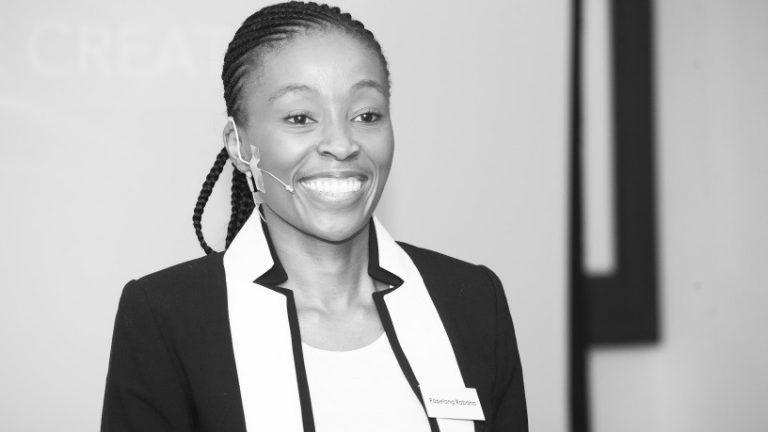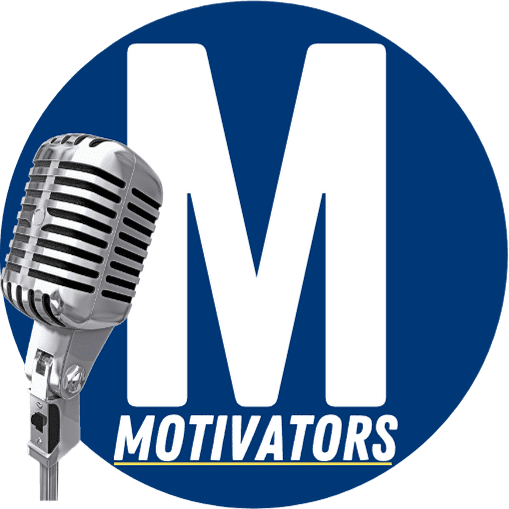Rapelang Rabana
Featured on the cover of ForbesAfrica magazine before the age of 30, named Entrepreneur for the World by the World Entrepreneurship Forum and selected as a Young Global Leader by the World Economic Forum – Rapelang is an internationally lauded technology entrepreneur. From her first startup straight out of university, to Chief Digital Officer at South Africa’s largest IT company, Rapelang is a true digital native.
As a founding partner of FFWD (fast forward) Innovation, Rapelang works with large organisations to skip the long strategy slides, the buzzwords and the AI-hype and make innovation real and measurable in your business. In 2021 she also co-founded the Norrsken Impact Accelerator (Sweden), to support and fund high-impact entrepreneurs. Rapelang has spoken at over 400 occasions on local and international platforms and has shared a stage with the likes of President Paul Kagame of Rwanda and best-selling author Malcolm Gladwell.
Awards and Highlights:
2025: Awarded Women in Tech Leadership 2025 at the South African National Innovation & Technology Awards
2024: Granted Honorary Membership into the Golden Key International Honour Society
2022: Recognized as Top 50 most inspiring women in technology, #InspiringFifty
2021: Awarded Best Women in STEM Solution at the MTN Business App of the Year Awards
2019: Attended World Economic Forum Annual Meeting in Davos; Gave Commencement Speech at University of Cape Town’s Graduation Ceremony
Typical efforts to innovate and results in billions of wasted expenditure. Successful innovation is not a matter of good intentions or elaborate analyses, but a result of adopting an experimentation-driven approach to testing early-stage ideas or initiatives, so you can get your own real market data to validate (or invalidate) that idea, before investing more resources. Whether you exploring a new product or service, improving your customer experience or simplifying key processes, shift your innovation efforts from endless pontifications and ‘thought-world’ exercises, to ‘real-world’ experiments and create lasting business value.
KEYNOTE: Learn what it takes to:
Generate new ideas in way that is accessible to everyone
Filter and choose the right ideas to take to market, avoiding being part of the statistic of 80% of ideas failing in the market, even if competently executed
Build realistic prototypes of solutions to put in front of real customers
Apply data-driven decision-making based on customer metrics
Adopt design thinking at work to get real business value
Build the muscle to be able to innovate into your company
WORKSHOP: Everything in the Keynote, PLUS:
Work ‘on’ your own business and get practical:
Apply the Theory of Constraints to identify experiments that would increase adoption, or
Apply Growth Hacking to identify experiments that could trigger rapid growth.
Digital Fluency is about getting past the digital buzz words and understanding technology in simple, practical ways. In today’s digital world, every professional must be digitally fluent. This means getting past mental blocks about technology being a ‘black box’ or something for coders, or reluctance to adopt new technologies or fear of being replaced by AI.
To fully leverage the power of the digital technology and be digitally fluent, we must change how we think about technology. At its core, technology is simply a method or technique that solves a problem by breaking a previous constraint. It’s about seeing technology as a mechanism to break constraints to solve business problems better. It’s about having the presence of mind to unearth limiting assumptions and know which technology capabilities to apply to unlock value in your organisation. Through AI, technology is finally powerful enough to match our imagination’s capacity to craft and deliver more effective solutions, to improve customer experience, reduce cost and generate new value.
To succeed in the world of generative AI and widespread digitalization of most industries, requires a reframing of role and contribution human beings bring to table. We have all heard about the need to be adaptable, resilient and to unlearn and relearn – but what does it take to become an altogether stronger and more capable person? Rapelang believes this journey starts with mastering your own mind to you understand the shortcomings of your brain when is faced with rigours of change and new challenges, so you can develop the mindsets, behaviours, and values that enable you to adapt to new situations. Combining that with digital fluency and an experimentation-driven approach to solving problems, is what will differentiate tomorrow’s winners.
KEYNOTE: Learn what it takes to:
Become the mechanic of your own mind and consciously support your own growth journey
Catch yourself adopting debilitating behaviour that prevents you from learning
Apply technology to existing life and business constraints to change how you do things
Experiment your way to must-have solutions that solve a real problem and are easy adopt
By 2030, the majority of the world’s youth will be African, and the entire population is expected to reach 2.5 billion by 2050. How will millions more people be able to access services and products as their spending power increases? The answer – disruptive innovation is essential to reach new and underserved markets.
Not all innovations are created equal. According to Clayton Christensen, only market-creating or disruptive innovations achieve inclusive economic growth and reach net new consumers, as opposed to the typical focus on sustaining and efficiency innovations that cater for established markets and customers. Deliberate efforts will be required by all players in the innovation ecosystem – from governments, big business, and start-ups to support the growth of market-creating innovations on the continent. Key challenges to overcome include: how we perceive and manage risk, developing venture capital markets, building the skills pipeline, and designing the right incentives and policies. ‘Growth is never by mere chance; it is the result of forces working together,’ James Penny.
These are many issues that blur Africa’s potential. But it is precisely the quantity and depth of these challenges that enable African entrepreneurs to appreciate problems and inefficiencies in a way that’s not possible when the challenges are not so serious. Leveraging the power of emerging exponential and digital technologies, African entrepreneurs are now living through an unusual time, in which the capacity of technology to solve problems is starting to match the scale of these market challenges.
Many of the challenges we see in Africa were solved long ago in higher income countries before the advent of digital technology. Typically, they were solved using analogue solutions, and even if things aren’t perfect, they work well enough for everyone to forget the flaws. Ironically, this has the effect of making inefficiencies less visible, and therefore provides less of an incentive for the creation of innovative digital solutions. This is what gives African entrepreneurs an advantage to innovate and ultimately export new solutions.
Synopsis: Self-awareness is the meta-skill of the 21st century. Tasha Eurich’s research shows that ‘when we see ourselves clearly, we are more confident, more creative, we make sounder decisions, build stronger relationships, and communicate more effectively. And we’re more-effective leaders with more-satisfied employees and more-profitable companies.’
Book Now
Contact us below to book this Motivator



